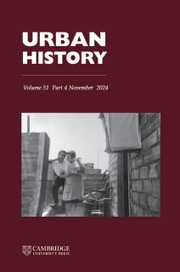R.J. Morris (1943–2022) – more familiarly known as Bob – was an urban historian of Britain and the wider world; Leeds, Belfast and Montreal were just some of the cities he researched and wrote about. Educated at Acklam Hall grammar school in Middlesbrough, he studied for his undergraduate and doctoral degrees at Oxford University. A lectureship in Economic and Social History at Edinburgh University quickly followed in 1968, where he would happily remain for the next 40 years. Bob was one of the pioneer generation, a youthful participant in the founding UK conference of urban history at Leicester in 1966. He never lost that original enthusiasm and curiosity for cities past and present.
It is unusual to devote a special section of an academic journal to an individual scholar. But then Bob Morris was not a typical figure, whether as a scholar or a person. For one thing, he never seemed to age, always appearing spritely in dapper clothes, always alert and curious. As a scholar, he was multidimensional, at once pedagogic innovator, urban explorer, photo-historian, computer enthusiast, initiator-organizer as well as the architect of a singular vision of the relationship between urban society and urban place. We have tried to pay tribute to Bob Morris in a manner that honours this multiplicity, not simply concentrating on his published work, influential as it is, but reflecting on his all-round contribution to urban history as a practice, a branch of knowledge and an institution. ‘Le style c’est l’homme même’ wrote the eighteenth-century philosophe, the comte de Buffon – ‘the style is the man himself’. That is not to denigrate intellectual substance but to say that in certain individuals, substance and style appear indistinguishable. As an epithet, it might accurately be applied to Bob. The essays that follow aim to capture aspects of the unique style of R.J. Morris, aspects which taken together represent the formidable legacy that he leaves to the global world of urban history.



